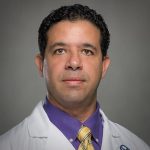Going Big Against Cancer
Read moreType: Game-Changer
Quynh-Thu Le, M.D.
Funded by The V Foundation Wine Celebration
Daniel Wechsler, M.D.
Funded by the Apple Gold Group
The CALM-AF10 chromosomal abnormality is seen in aggressive pediatric and adult acute leukemias that have a poor prognosis. Our lab has discovered that CALM-AF10 interacts with CRM1, a protein that helps transport other proteins from the nucleus to the cytoplasm. This interaction is required to activate HOXA genes, which play a critical role in both CALM-AF10 and other leukemias. This discovery suggests that CRM1 may be important in other leukemias as well, as is significant because a new class of drugs that inhibit interaction with CRM1 (SINEs-Selective Inhibitors of Nuclear Export) has recently been developed. These drugs are effective in a number of human tumor types, and are currently in clinical trials for adult leukemias. Our studies indicate that SINEs may block cancer cells through an unappreciated and novel mechanism-inhibiting CRM1 involvement in activating HOXA genes. In this proposal, we will examine the molecular mechanisms by which CRM1 activates HOXA genes. We will then identify additional CRM1 target genes that are involved in causing leukemias. Studying this previously unrecognized role for CRM1 will enhance our understanding of how SINEs work, and provide preclinical support for their use in pediatric leukemia clinical trials. Since HOXA genes are involved in many hematopoietic malignancies (including MLL-fusion leukemias that are seen in 80% of infant leukemias), these studies may have broad implications for leukemogenesis.
Terry Badger, Ph.D., RN, PMHCNS-BC, FAAN
Funded by Hooters of America, LLC
The purpose of our study is to test psychosocial interventions to improve quality of life (QOL) (psychological, physical, social and spiritual well-being) for Latinas with breast cancer and their family members or friends who are helping them during their cancer journey. Latinas and their family members/friends often experience severe psychological distress during cancer treatment and this distress can negatively affect health and well-being. Participants in our study are assigned to either an 8-week supportive health education intervention or an 8-week telephone interpersonal counseling intervention. Both the health education and the counseling is provided over the telephone, and each person who participates in the study is called separately. Our trained health care workers call the women and their family members/friends at times that are convenient for them. Sessions are about 30 minutes on the phone each week for 8 weeks. Using the telephone to deliver this service removes many of the access barriers normally associated with counseling or health education. Participants can receive help in the privacy of their own homes over the telephone. In addition to participating in the 8 education or counseling sessions, we ask the women and their family members/friends to complete some questionnaires 4 times over the next 6 months to determine if the intervention was helpful to them. All study related materials, assessments and sessions are conducted in English or Spanish, depending on the person’s preference. At the end of our study, we also tell them about any other clinical trials that may be of interest.
Hatem Soliman, M.D.
Funded by Hooters of America, LLC
Dr. Hatem Soliman, a researcher and breast cancer medical oncologist at Moffitt Cancer Center, will be conducting a project to help increase accrual to clinical trials for breast cancer patients. The aim of the project is to first assess patient awareness of cancer clinical trials, perceived barriers that may prevent participation and what information would help patients to more readily participate in trials. Information will be collected from a target of 100 Moffitt breast cancer patients. Once this initial assessment is completed, the second aim of the project is to use this information to create a web hosted video to address questions and issues identified through the survey as perceived barriers to breast cancer clinical trial participation and provide vital information that may help increase participation. A short post video survey will be administered to ascertain the impact of the information presented on increasing clinical trial participation. If successful, our ultimate goal would be to expand this methodology to other cancer types to help increase clinical trial participation.
Katherine Yeager, Ph.D., RN
Funded by Hooters of America, LLC
Cancer clinical trials provide much of the evidence for clinical guidelines and standards of care. All patients should have access to the latest treatments and the high quality care that typifies clinical trials. Unfortunately, a small percentage of patients enroll in cancer clinical trials, especially minorities. The purpose of this project is to develop and test an easy to understand culturally informed video with a racially diverse group of breast cancer patients and assess the effect of the video on clinical trial enrollment. This video, which will be easily accessed via smart phones, tablets, and computers, will provide standardized communication between the patient and healthcare provider and will address benefits and barriers through patient and physician stories. The setting for this project is Winship Cancer Institute, Georgia’s only cancer center designated by the National Cancer Institute. Our multidisciplinary research team will complete this study through the following four step process: 1) form a Community Advisory Board composed of individuals diagnosed with breast cancer to provide input 2) establish a tracking method to identify potential breast cancer clinical trials participants; 3) develop the video; and 4) pilot test the video. Simple, effective interventions are needed to support the cancer clinical trials enrollment process. This multi-disciplinary effort is a first step to provide educational programs to a diverse group of patients with the end goal of increasing enrollment rates. Results of this study will inform future educational programs and can be adapted to other minority groups.
Jedd Wolchok, M.D., Ph.D. & John Moral, M.D.
Funded in Collaboration With
Stand Up To Cancer (SU2C)
Pancreatic cancer is a lethal disease. 95% of patients die within 5 years of diagnosis, despite our best current treatments including surgery, chemotherapy, and radiation. By 2020, pancreatic cancer is projected to become the second leading cause of cancer death in the United States. Novel strategies to combat this deadly disease are urgently needed.
T-cells are highly specialized cells of the immune system designed to protect the human body from infections and cancer. In the past decade, we have discovered that T-cells recognize proteins that only cancers make, identifying cancers as foreign, triggering T-cells to kill cancers. Cancers however are equipped with strategies to escape T-cells. Our group has recently identified a drug paricalcitol that eliminates barriers that tumors have developed to block T-cell attack. Our preliminary findings demonstrate that this drug increases T-cell numbers within tumors by greater than 10 fold. These results are promising as it allows us to further boost T-cells with other drugs, and increase the ability of T-cells to kill tumors.
Our proposed research will delve deep into understanding the specific proteins on tumors that T-cell recognize, the specifics of how tumors create barriers to block T-cells, and combining paricalcitol with other drugs that boost T-cells in a clinical trial. Our proposals allow us to gain a deeper understanding of the biology of T-cells in pancreatic tumors so that we may develop better treatments to improve outcomes in patients.
John Cavanagh, Ph.D.
Funded by a challenge grant with
North Carolina State University
The Jimmy-NCSU V Cancer Therapeutic Program allows young researchers the opportunity to work on multiple facets of cancer research in a set of diverse labs, each investigating different approaches for developing cancer therapeutics.
Enhancing cancer drugs
We have discovered molecules that increase the effects of anticancer drugs by several orders of magnitude. Our goal is to reduce the working concentrations of all anti-cancer drugs in order to mitigate serious side effects. We will develop and screen our new molecules with both novel and existing chemotherapeutics against a variety of cancer cell lines in order to define the optimum combination treatment. Initial screens show effects against breast, renal and colon cancer cell lines.
Cell death and tumor formation
The life and death of cells must be balanced. Normal cells accommodate this balance by invoking programmed cell death pathways, referred to as apoptosis. In cancer cells, these pathways are defective and normal cell death does not occur, leading to tumor formation. In addition, faulty apoptosis causes tumor cells to be resistant to chemo/radiation therapies. If we could make apoptosis occur properly, we slow down tumor formation and overcome this resistance.
The protein caspase-3 controls apoptosis. If caspase-3 fails to function, cell death does not happen correctly. We also know that the protein calbindin-D28K binds to caspase-3 and stops it functioning. If we can stop calbindin-D28K from interfering with caspase-3, apoptosis would occur normally and the risk of cancer developing would be reduced. Consequently calbindin-D28K is a powerful target for anticancer drug development.
Stephen Gruber, M.D., Ph.D., MPH
Funded by Hooters of America, LLC
USC Norris Comprehensive Cancer Center offers over 23 trials for patients with breast cancer at the USC Norris Cancer Hospital and at the Los Angeles County (LAC) USC Medical Center, making them accessible to all. Participation in cancer clinical trials is a key measure for delivery of quality cancer care. Adult participation in cancer clinical trials remains at 3% and participation among ethnic and racial minorities and medically underserved communities is even lower. The Clinical Investigation Support Office, led by Dr. Anthony El-Khoueiry is dedicated to increasing minority accruals to clinical trials and has enlisted support from Dr. Julie Lang, a breast surgeon to support patient education and enrollment efforts. We plan to leverage our strong tradition of minority accrual (minority patients represent 56% of accrual to interventional therapeutic trials at USC Norris) and further enhance access to clinical trials for minority patients.
Michael Weber, Ph.D.
Funded by the 2015 Virginia Vine
“The Commonwealth Crushes Cancer” event
The promise of cancer therapies that target the mutationally activated “drivers” of malignant behavior is that highly selective drugs can be developed that will be effective with minimal side effects. However, that promise has not been achieved because most cancers rapidly develop resistance to these targeted therapies. Recent experience with the leukemias and lymphomas that respond to the drug ibrutinib provide a sobering example of both the successes and disappointments of these targeted approaches. Whereas many patients with malignancies of B-cells (Chronic Lymphocytic Leukemia (CLL), Mantle Cell Lymphoma (MCL) or Diffuse Large B-Cell Lymphoma (DLBCL)) show a beneficial response to treatment with ibrutinib, the responses are generally incomplete and often are not durable. The goal of the collaborative research proposal from UVA and VCU is to elucidate the important mechanisms of intrinsic and adaptive resistance to therapies for B-cell malignancies, and use this understanding to develop RATIONAL combinations of drugs that target both the driver of malignancy and the resistance mechanisms. The two groups have over the past few years taken complementary approaches to tackling this problem, and some of these discoveries are now entering clinical trial. The UVA and VCU groups will utilize materials from these clinical trials, as well as preclinical models and patient samples to develop tools to match patients with the most appropriate drug combinations, and to develop additional combinations of targeted therapies that will have deeper and more long-lasting benefits.












